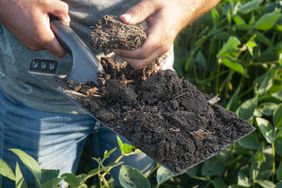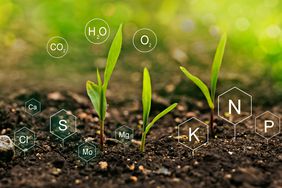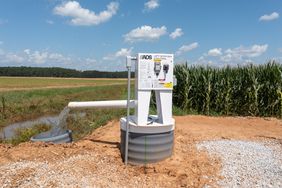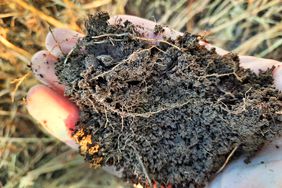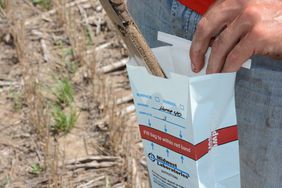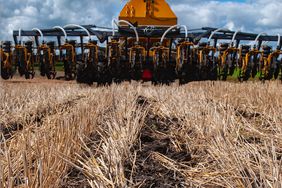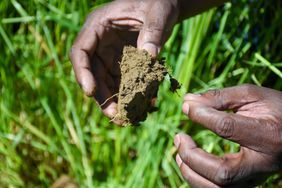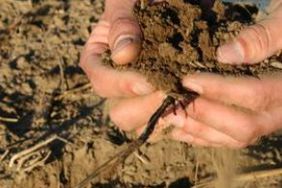:max_bytes(150000):strip_icc()/Soil20Sample-2000-a5180df0d0174c6a9a5c2bd7e1c3e266.jpg)
Meaghan Anderson
The perfect soil pH for growing field crops ranges between 6.2 and 6.8. If you get much above 7.3, the soil pH is considered high. This causes a reduction in nutrient availability and makes plants more sensitivity to certain herbicides - either the chemicals work too well, or not at all.
Robert Hoeft is an emeritus professor of soil fertility at the University of Illinois. He says particularly in soybeans, the two nutrients that are affected the most by high pH are iron and manganese.
"Both of them have very similar symptoms. They both have what we call "interveinal chlorosis". The veins stay green, in between the veins they get chlorotic or yellowed. With iron, the chlorotic area often times will go to a white, and the leaves will just look like they're bleaching out," says Hoeft. "On manganese instead of getting white, they tend to get a rusty appearance."
He says if you're east of the Mississippi river, you're likely to have a manganese deficiency. West of the river, it's usually iron that's lacking.
It isn't practical to correct a high pH problem in the soil itself, so foliar sprays are needed.
"If it's manganese deficiency you can spray them, they'll green up," he says. "If it's iron deficiency, it's more difficult to correct the problem with a foliar spray. With iron, you're better off selecting the varieties that are more resistant to the problem."
Hoeft says don't spray the entire field, just spray the affected areas. If other parts of the field aren't showing symptoms, it's not a problem.
Jason Clark is an extension soil fertility specialist at South Dakota State University. He says there is no quick fix, so you have to work with what's there.
"For field crops, bringing soil pH down with an amendment, there are some out there that tell you to put iron sulfate or elemental sulfur on. But as far as like a broad scale, that's not as feasible," says Clark. "So, a lot of things we tell farmers to do is first of all start with your starter fertilizer and make sure you're getting your micronutrient metals and others there. Sometimes you can add some manure applications to help with some of the nutrient availability."
He says phosphorous and iron-containing fertilizer can be applied in furrow at planting to facilitate uptake by crop roots before it has a chance to react to alkaline soil conditions.
Before you plant anything, hybrid selection is critical when the soil pH is too high.
"What variety of soybean, what variety of corn? Usually a lot of these are going to have some measure of low iron tolerance or some measure of that nature that you're going to look at to hopefully help the plant itself just through genetics be able to overcome that high pH issue," he says.
